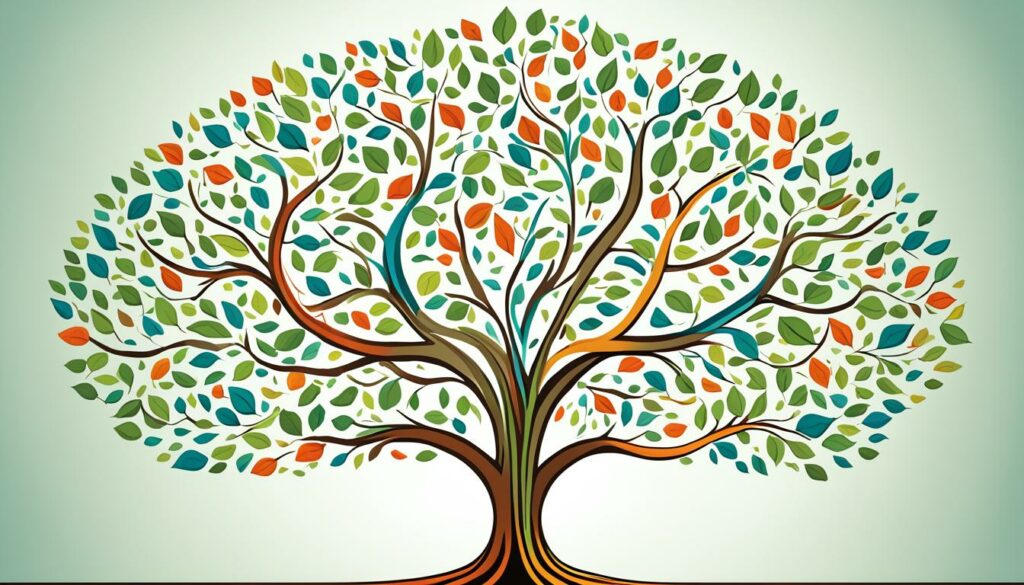A good content distribution strategy is key for making your marketing content more effective. The Loomly Blog notes that while 60% of marketers share one piece of content daily, the internet is very crowded. For example, Twitter sees 8,726 tweets every second. Google handles over 8.5 billion searches every day. So, having a smart plan is crucial.1 To improve your strategy, focus on doing well on social media, work with influencers, reuse your content, and use data for better promotion. Doing these things can enhance how far your content reaches and help you meet your goals.
Key Takeaways
- Evaluate the engagement, impressions, and conversion rates of the content across different platforms to identify areas for improvement.2
- Analyze which types of content resonate best with different audience segments and on various distribution channels.2
- Continuously analyze the audience to tailor content to evolving needs and preferences.2
- Utilize A/B testing best practices for mobile apps to refine content distribution strategies.2
- Leverage user-generated content and the growing creator economy to build brand awareness and drive engagement.3
Understanding Content Distribution Channels
Getting your content to a wide audience is key for successful marketing. The Loomly Blog says there are three main types of content distribution channels: owned, earned, and paid. It’s crucial to know the strengths of each to improve your content distribution plan.4
Owned Content Distribution Channels
Your company’s digital spaces that you have control over are called owned distribution channels. This includes your website, blog, and social media. Using these lets you decide how and when to share your content, keeping full control over your message.4
Earned Content Distribution Channels
Not paying for it, when others share your work, this is called earned distribution. It might be through reviews, social media posts, or a mention from a media outlet. You can’t fully control these channels, but they help spread the word about your brand and build trust with your audience.3
Paid Content Distribution Channels
To extend the reach of your content, you invest money in paid channels. This includes ads, sponsored content, or working with influencers. With paid methods, you can reach more people faster and direct them to your website.43
Knowing the pros and cons of each distribution channel is essential. It allows you to create a well-rounded strategy. A strategy that combines owned, earned, and paid methods to get the most out of your marketing content.43
Researching Your Target Audience
The first step in making your content strategy better is to know your audience. You can find out who they are by looking at your website, emails, and social media413>. Also, talk to your customers, email subscribers, and social media followers to get their direct thoughts.
Collecting Demographic Data
When you check your website, email, and social media data, you’ll learn a lot. You can see who your audience is based on their age, where they are, what they like, and how they like their content1. Knowing this, you can make your content and how you share it, fit them better.
Gathering Audience Feedback
Hearing from your audience through surveys or talking to them can tell you a lot. You learn what they want to know, what bothers them, and how they want to hear from you1. Using this feedback in your strategy makes what you share more meaningful to them.
Creating Buyer Personas
Putting together what you’ve learned helps you create detailed buyer personas. These are profiles that show what your ideal viewers are like including their traits and what drives them. With these personas, you can share content in ways that really connect with your audience1.
Knowing your audience well is key. It makes sure your content and how you distribute it match what they want and how they act1. This kind of targeted effort makes your content more effective and engaging.
Auditing Your Existing Content
Before you improve how you share your content, you must check what you already have. This process includes listing all your content, checking how well it does, and spotting any missing parts.
What does ‘missing parts’ mean? It’s like seeing where you need to add more to make your content plan complete.
Logging Your Content
Tools such as Screaming Frog are great for checking and listing all your content. They create a central place to see everything your website has to offer.5 So, you get a clearer picture of what you’re sharing with the world.
Assessing Content Impact
With tools for analytics, you can look deeper at how well your content is doing. You can see what your readers like and don’t like. This helps you plan better for the future.
Remember, knowing what your readers enjoy is key to making your content strategy work.
Identifying Content Gaps
By comparing your content with what’s trending or what your competitors are doing, you can figure out what’s missing. This helps you see where you can do better.5 For a great content plan, you need the right topics, types of posts, and strong content.
Doing a full content audit gives you lots of power. You can use what you learn to share better, more valuable info with your readers.65 This can make a big difference in how successful you are.
| Metric | Description | Importance |
|---|---|---|
| URL/Title | The web address and title of the content | Helps organize and categorize content |
| Publication Date | The date the content was published | Identifies outdated or time-sensitive content |
| Word Count | The total number of words in the content | Provides insights into content depth and format |
| SEO Metadata | Title tags, meta descriptions, and other on-page SEO elements | Evaluates content optimization for search engines |
| Behavioral Metrics | Bounce rate, conversion rate, and other engagement data | Analyzes audience interaction and content performance |
| Quality Indicators | Readability, broken links, and other content quality factors | Ensures content meets quality standards |
Choosing the Right Content Distribution Channels
After learning about your target viewer and checking your current content, the next step is picking where to distribute it. This choice includes owned, earned, and paid ways, based on what your audience likes, your resources, and your goals.7 The idea is to use different ways to spread your content. This can make your message broader and stronger through a multichannel content distribution plan.7
Things you run, like your website and social media, fall under Owned Content Distribution Channels.7 Earned Content Distribution Channels look at places where others share your content. Like when people review your product or mention it in the news.7 Paid Content Distribution Channels are about paid marketing. This includes PPC ads and paying influencers to promote your product.7
It helps to think about each way of reaching people. Then, you can choose the best ones for your viewers and aims.7 Mixing different methods means you can make the most of what each one offers. This approach can increase the range and power of your message.7
| Content Distribution Channel | Key Advantages | Potential Drawbacks |
|---|---|---|
| Owned Channels |
|
|
| Earned Channels |
|
|
| Paid Channels |
|
|
Understanding what each channel can do and what they may fall short at is key. This helps you build a strong multichannel content distribution plan. It lets you connect with your audience in diverse and effective ways. Plus, it boosts your brand and drives real interest in your message.7
Setting Content Distribution Goals and KPIs
The Loomly Blog highlights how crucial it is to set content distribution goals and KPIs. These help you gauge how well your work is doing.4 Things to measure are website visits, how people interact on social media, and if you’re pulling in new leads.
By doing this, you can see how effective your content distribution strategy is. Then, you can use what you learn to improve your plan. Over time, this approach makes your efforts more successful.
Fitting your content distribution goals with your marketing aims is vital for long-term achievement.
| Content Distribution Goals | Content Distribution KPIs |
|---|---|
|
|
Setting content distribution goals and keeping an eye on the right content distribution KPIs is key. It allows you to tweak your strategy. This keeps it in line with your broader marketing goals.8 Using insights from measurements can improve how far and how well your content reaches people.
How Can You Refine Your Content Distribution Strategy
The Loomly Blog shares ways to improve your content distribution. It’s key to keep checking your audience. Make your content fit their changing needs and likes.2 Keep an eye on new trends and places to share content.2 Use old but good content again in new ways. This can be by making it fit different formats.2 Then, track how well your content does and tweak your plan based on data.2
Always adjust and keep your strategy flexible. This way, your content will meet the right people at the right time through good channels.2 Doing this well is very important for your content to stand out online.3
The Loomly Blog talks about sending personal content through many channels.3 Brands should use both long-lasting and current content. This keeps what they say up-to-date.3 Working with expert content makers and others is key for getting your content out there successfully.3
The focus these days is on getting content right, not just out there.3 Making content that’s real and speaks to people is what matters most. It helps you connect better with your audience.3

Follow these tips to make your content reach more people, better. Keep your audience in mind. This will help boost your marketing’s success.23
Building an Editorial Calendar
The Loomly Blog says creating an editorial calendar is key to improve your content strategy. It means getting all your publishing and promoting on the same page. So, you publish new content in a smart way.9
Aligning with Content Creation
Your plan should show when and where you’ll post, plus any ads or emails.9 This lets you boost how many see your content by planning it right.
Scheduling Content Distribution
An editorial calendar visually lays out your daily, weekly, or monthly content plans. It tracks what content to post when, where, and by who.9 This is the one place to see what’s coming and what’s worked before.
Editors and creators set goals like when to post, staying on topic, keeping it regular, and catching people’s eyes.9 Using a calendar helps by making it easier to plan. You get better content, run smoother, and talk better as a team. Your plan’s also more likely to succeed.9
Creating and Optimizing Content
The Loomly Blog talks a lot about making your content better and getting it out there more effectively. They suggest using different kinds of content like blog posts, videos, infographics, and podcasts to connect with people on their favorite platforms4. Also, tweaking your content so it shows up better in search results by using the right keywords, meta tags, and other search engine tricks can get you more visitors2. Adding cool visuals like images and videos makes your content fun to look at and easy to share on social media and other places.
Leveraging Content Formats
Make different kinds of content to match the varied likes and habits of your audience. You could write long blog posts, make exciting videos, or create informative infographics. Having a mix of these can get your audience more involved and help your message stick with them. Test out different formats and see what works best to tweak your strategy.
Optimizing for Search Engines
SEO is very important for making your content stand out. It involves finding the right keywords, writing catchy titles and descriptions, and making sure your content is easy for search engines to find2. Doing these things well means more people might find your website or content, leading to more interest and maybe even more people taking action.
Incorporating Visuals
Using pictures and videos makes your content more attractive and more likely to be shared. Find visuals that fit well with what you’re talking about and are of good quality3. Making sure these visuals are also set up for search engines can help even more people find and appreciate your content.

Distributing and Promoting Content
The last step in making your content strategy better is to share and promote it widely. This means putting it on social media, sending it through email to your followers, and working with popular people in your field. These steps help more people see and know about your work.
Social Media Distribution
Places like Facebook and Twitter are great for spreading your message. With so many tweets and searches every second, being active on social media is vital. It lets you connect with a big audience in a quick and easy way.4Sharing posts and updates on different platforms like Facebook, Instagram, and Twitter boosts the chance of others noticing them. This helps make your marketing activities more visible and interesting.
Email Marketing
Sending emails is still a good way to share what you’re doing with people. Since millions of blogs are written every day, making your email stand out is crucial. Interesting emails can bring people to your site and help your business grow.4It’s essential to be creative with your emails. By sending engaging updates, you draw more readers to your content and brand.
Influencer Outreach
Working with popular figures in your area can really boost your outreach. By 2022, companies might spend $15 billion on this type of marketing, showing its growing importance.4Most folks are more likely to buy things when they see reviews and photos from other customers. Using influencers to share your message can get more people interested in what you do.3Joining forces with the right people online lets you use their strong connection with fans. It’s a smart way to bring more visitors to your site and engage a wider audience.
Using different ways to share your content, like your own efforts, sharing by others, and paid reach, helps a lot. Nowadays, people trust advice from real people more than from companies. So, reaching people through many channels is very important.3It’s key to spread your content in many different ways. This helps ensure more people see and value what you share.
Measuring and Analyzing Results
The Loomly Blog suggests checking the results of your content sharing often. This means keeping an eye on things like website visits, how people interact with your content, and how many people take action because of it. By doing this, you can figure out what you’re doing well and what needs work.10 Making decisions based on data can improve your content and how you share it. Remember, your plan will always need a little tweaking. This is because what your audience likes and where they see your content can change over time.
Tracking Distribution Metrics
Using tools like Google Analytics and HubSpot can give you a peek into how your content sharing is doing. These tools can track things like the number of people seeing your content or how long they’re spending on it.10 Knowing these details can show you if your content is grabbing attention and leading to actions.
Identifying Areas for Improvement
Looking at the data from your sharing can help you see what’s working and what’s not. This process helps you find the best content to use again and what content might need a change.10 These insights can also clue you into what your audience really wants. This helps you adjust what you create and where you share it.
Refining the Strategy
Keep tweaking your content sharing plan through checking, analyzing, and making changes. Doing this will keep your marketing strong and able to meet new challenges.10 This approach lets you use your resources wisely, connect better with your audience, and see better results for your hard work.10 Adapting your plan as things change in your field is crucial for staying ahead online.
Conclusion
Refining how you share content is key. It helps your marketing materials stand out in a busy online world. You need to know who you’re aiming for11, check what material you already have11, pick the best ways to share it11, set clear goals11, and plan when to share it11. Doing this lets you create a smart plan to get your content out there.
It’s also crucial to regularly review, test, and learn from how you distribute content. This helps make sure it’s seen by the right people at the best times. Smarter sharing equals better marketing results.
Focusing on what your audience likes and how they act can really boost interest and loyalty. Mixing how you share content, including methods you own, earn, and pay for11, can increase how many people see it. Personalizing your messages and using data to guide decisions1211 is a winning strategy. It makes sure your content connects with exactly who needs to see it.
In the end, getting your content distribution spot on is crucial for top-notch content marketing. Keep tweaking and updating your strategy to keep up and make the biggest impact for your business. It’s all about staying ahead of the game.
FAQ
What are the key steps in refining your content distribution strategy?
What are the different types of content distribution channels?
Why is researching your target audience important for refining your content distribution strategy?
How can content auditing help refine your distribution strategy?
What is the importance of setting content distribution goals and KPIs?
How can building an editorial calendar help refine your content distribution strategy?
What are some ways to create and optimize content to support your distribution strategy?
How can you effectively distribute and promote your content?
Why is it important to continuously measure and analyze the results of your content distribution strategy?
Source Links
- https://www.teezagency.com/blog/how-to-refine-your-content-distribution-strategy-for-content-marketing
- https://www.adjust.com/blog/refining-content-distribution/
- https://www.bazaarvoice.com/blog/the-new-shift-in-content-distribution-strategy/
- https://blog.hubspot.com/marketing/content-distribution
- https://divvyhq.com/content-operations-governance/the-right-way-to-perform-content-audits/
- https://www.digitalmarketer.com/blog/how-to-audit-your-existing-blog-content/
- https://literalhumans.com/how-can-you-refine-your-content-distribution-strategy/
- https://www.oneims.com/how-to-develop-an-effective-content-distribution-strategy/
- https://contentmanagementcourse.com/content-planning/editorial-calendar/
- https://www.clearvoice.com/resources/measure-success-content-distribution/
- https://rankbuilder.pro/content-distribution-strategy/
- https://contentatscale.ai/blog/how-can-you-refine-your-content-distribution-strategy/


